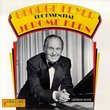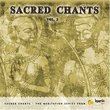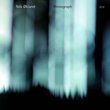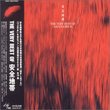| All Artists: Handel, Gerard Schwarz, Los Angeles Chamber Orchestra, Susan Ranney, Kenneth Munday, Douglas Davis, David Shostac, Patricia Mabee, Robin Graham, Allan Vogel Title: Handel: Water Music (Complete) Members Wishing: 0 Total Copies: 0 Label: Delos Records Release Date: 12/11/1992 Genre: Classical Styles: Forms & Genres, Suites, Historical Periods, Baroque (c.1600-1750) Number of Discs: 1 SwapaCD Credits: 1 UPC: 013491301020 |
Search - Handel, Gerard Schwarz, Los Angeles Chamber Orchestra :: Handel: Water Music (Complete)
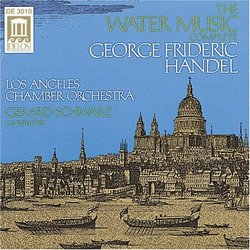 | Handel, Gerard Schwarz, Los Angeles Chamber Orchestra Handel: Water Music (Complete) Genre: Classical
"The Celebrated Water Musick," as it was called in the early editions, is the most famous and perhaps the finest orchestral music written by George Frideric Handel (1685-1759). Not surprisingly, it has remained popular sin... more » |
Larger Image |
CD DetailsSynopsis
Album Description "The Celebrated Water Musick," as it was called in the early editions, is the most famous and perhaps the finest orchestral music written by George Frideric Handel (1685-1759). Not surprisingly, it has remained popular since the early 18th century, and through the decades and centuries has graced all sorts of festive and happy occasions.Most of the pieces which make up the Water Music were written for royal water parties on the Thames. Outdoor serenades in general and aquatic serenades in particular were popular in the 18th century. George I, who liked to have water parties on the river, was often attended by a second barge with musicians to provide the entertainment. Spenser's "silver Thames," was one of the main highways in London, and certainly more quiet and pleasant than the streets. Boats were for hire on much the same basis as present-day taxis, and the private barges were luxuriously outfitted. The release from everyday constraints and cares which many feel when on the water, and the unique enhancement of sound provided by its reflection over the water, also must have added to the festive setting for Handel's noble melodies and joyous dances.The Water Music contains some of Handel's richest orchestral scoring, and requires unusual virtuosity from the brass and woodwind players. Wind instruments were of course ideal for outdoor performance, and Handel, as a practical 18th century musician, made full use of them. In fact, he was evidently using French Horns for the first time in this score. Opportunities for lovely contrasts in tone color are provided by directions for some of the pieces to be played three times, each time with a different orchestration. In the Baroque tradition, phrasing and articulation, dynamics and ornamentation were left to the performers, and it was understood that melodies and harmonic structure would be embellished freely. The edition used in this recording was made by Gerard Schwarz.Throughout the Water Music, one finds the qualities, and their alchemy, which make Handel's music immediately recognizable to the listener: the simplicity that speaks directly from the heart, the nobility and at times even grandeur, the fundamental joy that is never far away, the sense of inexhaustible energy, the warmth that pervades what was called in the 18th century "the open and manly style of Handel," and the melody which flows through every mood and form. As Newman Flower wrote, "He caught the moods of the world and set them to song." A citizen of the world in his musical and cultural background as well as in his outlook, a composer Beethoven and Haydn admired as perhaps no other, Handel was, as Herbert Weinstock put it, "one of the most majestic, tender, and human voices ever lifted in praise of life, of love, of beauty and of the art of music." Similar CDs
|
CD ReviewsHandel In The Flesh--250 Years Later Andrew K. Wong | Pasadena, CA | 02/02/2000 (5 out of 5 stars) "This must be one of the finest recordings of "The Water Music," if not the best (with due respect to the renditions of Trevor Pinnock and Neville Marriner, among others). It is an unofficial truism of classical music that the best recordings of a piece are made by conductors and artists of the same nationality as the composer. Handel was German by birth, but principal Court Composer to King George I of England. Thus, English artists dominate most interpretations of "The Water Music" and are enjoyable in their own right--performances touched with the pagaentry, pomp and circumstance of His Majesty's Court holding royal water parties on the River Thames. Schwarz's rendition, however, captures not only the best of the courtly ambience on the Thames but Handel's passion as well. Schwarz and the Los Angeles Chamber Orchestra not only inspire and refresh but set you on the edge of your chair with every passing movement. It is hard not to press the "repeat" button on the compact player after the piece is finished. King George I himself commanded that the orchestra repeat "The Water Music" three times that night in July, 1717, along the Thames. The tempos are varied, lively and brisk but are never rushed as in many other recordings. The predominance of strings and woodwinds give the piece a light and airy tenor. Most impressive is Schwarz's "terracing" of both expression and orchestration. In the Bourree ending Suite II in D, for example, Schwarz uses only the strings the first time, adds the woodwinds the second time, and then commits the full orchestra the third time. Moreover, the gradual expression of piano to mezzo forte to forte in the Bourree is typical of Schwarz's interpretation. Schwarz is faithful to all of Handel's instructions to repeat certain movements. As a result, the amount of music on this CD is greater than most other recordings of "The Water Music." The digital sound is bright, clear and forward with no edge. The Los Angeles Chamber Orchestra delivers a virtuoso performance. The tonguing and trills of the brass is brilliant. This tantalizing ornamentation debuts in the Minuet of Suite I and crescendoes to its peak in the Allegro and Alla Hornpipe of Suite II. As with the expression and orchestration, the ornamentation also terraces with each passing refrain. This improvisation is true to Handel's intent for the piece, to the style of Baroque music and would make the composer beam. There are many other outstanding features of this performance that a review could not do justice to. Perhaps the most apt characterization of this recording is that the listener feels Handel's passion pumping in his blood. Handel was the one who shut himself in his room for well-nigh a month with scant food and water and even less sleep as he churned out the greatest oratorio ever to grace the heavens in "The Messiah." Handel was also not above engaging in a duel now and then to avenge perceived insults. Schwarz's rendition of Handel's "The Water Music" does justice not only to the piece, but to the man behind the music." Best Recording Of Handel's "Water Music" Erik North | San Gabriel, CA USA | 02/21/2006 (5 out of 5 stars) "Many classical listeners became acquainted with George Frideric Handel's masterpiece "Water Music" through the modern orchestration made by Sir Hamilton Harty in the early years of the 20th century, an orchestration that is for some as hard to take as Stokowski's transcriptions of Johann Sebastian Bach's great organ pieces. Most conductors since, however, have chosen to go with the intimate baroque scoring that Handel originally had in mind, whether they are conductors of modern orchestras or period-instrument ensembles.
This is what the Los Angeles Chamber Orchestra and conductor Gerard Schwarz had chosen to go with on this 1980 recording of this baroque masterwork, a recording that is arguably the best such recording out there. In a tactic that Handel would have found appropriate, Schwarz divides the work up into three different sections that spotlight certain sections of the orchestra. Suite No. 1, in F Major, is given over primarily to the French horn players; Suite No. 2, in D Major, spotlights the trumpets; Suite No. 3, in G Major, is primarily a showcase for the flutes and oboes (and a piccolo), underpinned as on the other suites by a harpsichord. As is very much typical for Handel, both the full orchestra and the instrumentalists spotlighted need to be on their toes constantly. This is what happens on this recording: everyone navigates through this work with a flourish. This recording's particular version of the "Alla Hornpipe" in the D Major suite is pulled off with particular skill, as is Schwarz's arrangement of that suite's final Bourree. Patricia Mabee provides the harpsichord continuo ornamentations that are part-and-parcel of the baroque period. The quality of the Delos engineers, made in December 1980 at Bridges Auditorium in Claremont, is an added bonus. Of the dozens of recordings made of this venerable baroque masterpiece, very few have really come close to this one (with the possible exception of Raymond Leppard's 1970 Philips recording with the English Chamber Orchestra). It is a highly recommended recording." |

 Track Listings (18) - Disc #1
Track Listings (18) - Disc #1
